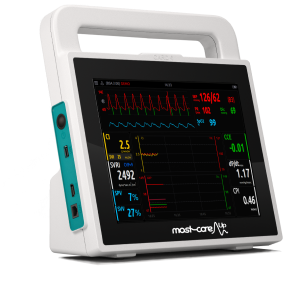1 in 5 deaths globally is associated with sepsis. To coincide with World Sepsis Day, Vygon is raising awareness of the importance of advanced haemodynamic monitoring.
Advanced haemodynamic monitoring is fundamental to clinicians who need to make life-saving decisions based upon real-time data to support patients with sepsis and septic shock. Recognising sepsis in patients who are severely ill can ensure prompt treatment, which can significantly reduce mortality.
In its latest report[1], the UK Sepsis Trust outlines Sepsis Six, a life-saving protocol aimed at significantly reducing mortality rates. Step five of six targets fluid delivery, highlighting cardiac output monitoring (COM) equipment as beneficial.
James Leek, Business Unit Manager at medical device manufacturer Vygon UK, says: “Fluid administration and targeted drugs are crucial in optimising oxygen delivery, and the use of cardiac output monitoring for providing and maintaining a clear picture of response to intervention in a deteriorating patient is vital.
“This World Sepsis Day, we’re backing the Sepsis Trust and raising awareness of the importance of early identification and the role of COMs, like Mostcare Up, to manage septic shock.”

Vygon’s Mostcare Up is a pulse contour method of cardiac monitoring. It calculates cardiac output beat by beat, by assessing the morphology of the arterial pressure waveform using a patented algorithm.
The monitor increases the sampling time of the arterial waveform to identify minute, real-time changes in vascular tone, ensuring that the monitor can be used in the very sickest of patients without the need for calibration. In addition, a dynamic, built-in e-filter removes hyper-resonance of the system to aid waveform optimisation and provide the best possible data for analysis.
James adds: “Technology and robust software is now allowing us to dig much deeper. While there is a proliferation of choice, we can demonstrate clearly the level of insight Mostcare Up can offer. In suspected sepsis, where deterioration can happen quickly, this information could be lifesaving.”
Developed and manufactured by Vygon’s expert team, the very first devices were introduced in 2012 in Italy. It is now used worldwide in both adult and paediatric populations including several NHS Trusts – supporting the nation’s most critically ill patients.
James says: “The biggest impact on access to COMs in the UK is national guidelines, which is why some countries, specifically within Europe, have adopted the technology in far greater volumes.
“For example, in Italy, national guidelines stipulate that every ICU bed must have a COM attached to it.
“The benefits of COMs are taught within UK medical schools; they are used frequently and it is acknowledged that better data via such devices aids clinical decision making. Hopefully in future we will see a shift in the UK, from cardiac output monitoring ‘should be considered’ to ‘should be available’.”
According to the UK Sepsis Trust, in the UK, there are at least 200,000 episodes of sepsis in adults each year. Estimates are as high as 918,000[2], with around 48,000 people dying as a result. Sepsis claims more lives than breast, bowel and prostate cancer put together.
Moreover, it reports that sepsis costs the NHS between £1.5 and £2 billion each year, and the wider economy at least £11 billion and possibly as high as £15.6 billion, putting the direct cost of sepsis at 1% of NHS budget.
References
[1] The Sepsis Manual, 6th edition 2022
[2] Academy of Medical Royal Colleges 2022
